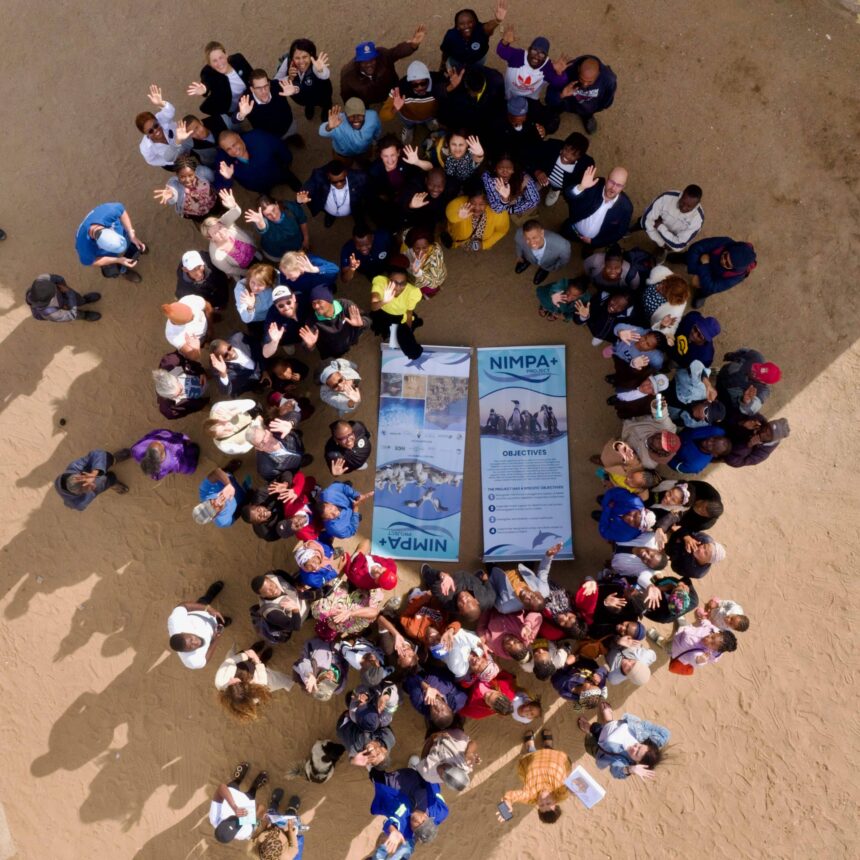Press Release
The mayor of Lüderitz His Worship Benjamin McKay together with the Ministry of Fisheries and Marine Resources (MFMR) launched the Strengthening Namibia’s marine protected area management and improving livelihood opportunities of coastal communities (NIMPA+) project on 11 October 2023 in Lüderitz, Namibia. The project is implemented by the Namibia Nature Foundation (NNF) together with Blue Marine Foundation; GRID-Arendal; The Southern African Foundation for the Conservation of Coastal Birds (SANCCOB); South Atlantic Environmental Research Institute (SAERI); Community Skills Development Centre (COSDEC Benguela); and Namibian Foundation for the Conservation of Seabirds (NAMCOB) as subgrantees. Key attendees of the launch were Judith Weigand from the Blue Action Fund, members of the Lüderitz Small-Scale Fishers Association and the Shack Dwellers Federation as well as members of the Lüderitz community. The NIMPA+ project is financed by the Blue Action Fund, Oceans 5, Shark Conservation Fund, Albatross Task Force, Namibian Chamber of Environment (NCE) and the Debmarine – Namdeb Foundation.
The overall objective of the NIMPA+ project is to Strengthen the management of NIMPA to conserve important biodiversity and marine ecosystem services, in turn securing income opportunities for coastal communities and diversifying their livelihood opportunities while working towards the designation of two new MPAs at the national level. The 9,500 km2 Namibian Islands’ Marine Protected Area (NIMPA) is an iconic area of outstanding marine biodiversity, supporting globally significant populations of seabirds and marine mammals, and important marine industries. Despite its status as Africa’s second-largest marine protected area, NIMPA is under threat from pollution, climate change and under-resourced management. To address these issues, the NIMPA+ project supports the Namibian government to develop and implement a management framework for NIMPA. This framework will draw on the latest scientific evidence and provide a blueprint for effective decision-making, setting clear thresholds for key environmental indicators and prioritizing sustainable resource use. To ensure the long-term sustainability of NIMPA and its Strengthening Namibia’s marine protected area management and Improving livelihood opportunities of coastal communities surrounding communities, the newly established non-profit organization, NAMCOB, supports the government in managing and monitoring the protected area. It also plays a vital role in engaging the community in marine conservation and supporting coastal tourism.
“The contribution made by the blue economy towards the overall small-scale fishing industry should not be ignored and requires vigilant policies to ensure longevity. I do believe that this launch is a major milestone for our community and the small-scale fishing sector at large. This launching shows the spirit of “pull together in the same direction” and no one should feel left out.” – His Worship Benjamin McKay.
Judith Weigner, the Director of Grants for the Blue Action Fund, who was also in attendance emphasised that this is the first time that they are funding a project on the Atlantic coast of Africa. She further stated that this project aims to protect not only important biodiversity, but, it also represents the collaborative efforts between various stakeholders including government, non-governmental organisations, coastal communities, and passionate individuals. project funding a country on the coast of the Atlantic ocean
By developing innovative new strategies for sustainable resource use, the NIMPA+ project supports small-scale fisheries, gleaners, and entrepreneurs improving their economic benefits while at the same time protecting one of the world’s most important marine ecosystems.



Leave a Reply